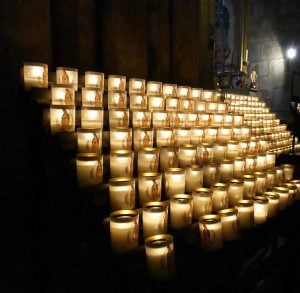Can I Admit I’m Wrong?
 Today we find ourselves in the third Sunday of Lent, a period of 40 days leading up to Easter in which we are invited on a journey with Jesus, a journey of self-examination, a process of gathering the courage we need to ask hard questions about our lives. Over these past weeks we’ve asked the questions: Can I resist temptation? And, can I give up my life? Hard questions for sure.
Today we find ourselves in the third Sunday of Lent, a period of 40 days leading up to Easter in which we are invited on a journey with Jesus, a journey of self-examination, a process of gathering the courage we need to ask hard questions about our lives. Over these past weeks we’ve asked the questions: Can I resist temptation? And, can I give up my life? Hard questions for sure.
Today’s passages invite us to ask a question that’s perhaps trickier than most, because this one is shockingly personal. And aside from the pain of turning the mirror on ourselves to ask if we can admit we’re wrong, Jesus is leading us into some tricky theological waters this week in this strange little passage from Luke’s gospel, chapter 13. He’s asking us to consider how we think about right and wrong, blessing and punishment. He’s asking us to reconsider our understanding of how God works in the world. And he’s challenging us to reject canned responses and easy explanations for our pain; to open ourselves to the grace and forgiveness of God; to repent.
In today’s gospel passage, a group of folks were standing around the town square gossiping about a recent local tragedy—apparently some Galileans had been killed by the Roman ruler Pilate in cold blood.
While the crowd was trying to make sense of this, along came Jesus, who by now had gained a reputation as an up and coming young rabbi—a religious teacher. How timely! They’d just go ahead and ask the new rabbi to give them the answer to the universal question of human suffering. They already knew what he was going to say, anyway: those Galileans must have done something REALLY bad for God to punish them with that terrible tragedy!
But Jesus, as he always, always seems to do, takes this opportunity to turn their common understanding of God, and of themselves, completely upside down. He tells the crowd that, nope…those Galileans weren’t any worse sinners than all of you.
Silence…or maybe some gasps in the crowd.
Jesus went on. And what about the eighteen people who were killed when a tower in Siloam randomly fell on them—remember that? Yeah, they weren’t being punished because they were worse sinners than everybody else, either.
What?
Jesus didn’t answer their question like they thought he would. He didn’t say these tragic events were the result of sin. He didn’t reinforce their oft-used cause and effect theology. And so, the folks standing there were offered an opportunity to rethink the way they’d seen everything up until then, to admit they were wrong—to repent.
And so are we.
It’s strange now, to stand in this beautiful and holy space and think about the events of September 11, 2001. I feel like this is my city now, but it wasn’t then. I wasn’t here for the terror some of you lived; I saw it unfold on TV.
As you know, it was a Tuesday morning. Everyone who can remember that day surely has a story about where they were when they heard the news about airplanes crashing into tall towers in New York City. I was at work in the church office in New Orleans where I was one of the associate pastors. Early that morning we started to get telephone calls that something terrible had happened, so we wheeled in the television from the media closet to watch the news reports along with everyone else in the entire world.
As my colleagues and I sat around wordless with horror, it began to gradually dawn on us that we were going to have to craft some kind of response for the people of the congregation.
Seminary does not prepare you for a lot of things about this job: fire alarms going off in worship, church attendees in super hero costumes, and as it turns out, horrifying disasters that leave the whole world feeling helpless, fearful, and frightened. The congregation of The Riverside Church is an unusual place; often a place of solace when the world falls apart—as you were for so many in the days following 9/11.
But my colleagues and I hadn’t been accustomed to regularly responding to such corporate tragedy. The only thing we were sure of was the fact that people would want to come to church, because that’s where we wanted to be.
So that night, after scrambling all day to try to craft liturgy for the occasion—we scoured the sermons of pastors like Peter Marshall and Harry Emerson Fosdick to see what they did after the bombing of Pearl Harbor; we collected twigs of rosemary as symbols of remembrance; we composed prayers watered with tears; and we opened the doors of the church. And that night people did come to church, a lot of people from our congregation…and a lot of people we had never seen at church before.
As you know that trend was not unique to the little congregation I served then. Surveys of Americans found significant increases in attendance at religious services immediately after 9/11. They found:
- Attendance at worship services increased by 25%.
- People reported an increase in daily prayer.
- The percentage of Americans who said religion was very important to them increased by almost 10%.[1]
We came to church for different reasons: comfort, community, safety. But most of all, Americans say they came trying to understand. Why do bad things like this happen?
When they do, especially on a large scale like 9/11, we’re desperate for an explanation, some framework in which we can put our grief and pain and fear. And one of the easiest, most natural ways to explain suffering is to put the responsibility on a God who acts according to some divine tally and hands out punishment or blessing as the situation demands.
You know what I mean. We come up with explanations for tragedy or pain that are outlandish, like attributions of the tragedy at Sandy Hook to gay marriage. We also do it in more subtle ways (think of your grandmother’s off-hand comment upon an unexpected success—“You must be living right!”).
However we do it, it’s a common human default to think about our lives that way. Why? Because security sells. And “[b]ecause tragedies arrest our attention. They shake us out of the stupor of ordinary life. They impress on us, better than any preacher’s [hellfire and brimstone sermon, the frailty of our lives].”[2] So putting some semblance of order, cause and effect, around what we cannot for the life of us understand, gives us some illusion of control, some sense that we can appease this God who controls the universe and rains down blessing or curse in measured, predictable ways.
Barbara Brown Taylor says, “(1) [This kind of thinking] answers the riddle of why bad things happen to good people: they don’t. Bad things only happen to bad people. (2) It punishes sinners right out in the open as a warning to everyone. (3) It gives us a God who obeys the laws of physics. For every action, there is an opposite and equal reaction.”[3]
See? Nice and tidy.
But in this gospel passage, Jesus won’t let us loiter there. Instead, Jesus preferred to upset the apple cart, to challenge the standard interpretation of life as they (and we) know it. He wanted to talk with them about something else altogether…he wanted to talk about repentance. And he wanted to ask them a very hard question: can you admit you’re wrong…and change?
Jesus looked at the crowd and said to them all, “Nobody is exempt from punishment, people who have towers fall on them or people who get away scot free. All of you—ALL of you—need to repent.”
And so, then, Jesus tells a story. In this parable there was a man who used some of the farming land in his vineyard to plant a fig tree—not for looks or shade or anything other than he hoped to have some FIGS! But it had been three years since he’d planted it, and that fig tree had not produced one single fig. The landowner was thinking it was time to cut the tree down and stop wasting soil that he could be using for something that was actually producing good fruit.
Then, as the story goes, a gardener appears, the guy who was responsible for tending the vineyard, and he asks the landowner to just give him a little more time. Let him care for the tree a little more, fertilize it, make sure it has enough water and sunlight. Give it one more chance, one more season, he asks the owner. And if it’s still not producing figs after that, we’ll go ahead and cut it down.
Oh, Luke, what were you trying to tell us by placing these two little passages together? And what could Jesus possibly have meant?
Because we like clear structure for understanding the way God works in the world, it’s tempting for us to read this parable and use it to explain why bad things happen: God is the vineyard owner who is impatient with bad people who are not living right. Jesus is the gardener who comes to advocate on our behalf, etc. We have clear directions, a cause and effect God.
But that wouldn’t make any sense. Because we all have bad things happen, and we all die. And this way of thinking contradicts what Jesus was trying to say in the verses just beforehand.
If we want to assign roles here, maybe we should try it this way. The landowner is the terrible thing that happens—the ending of a life—a living tree pulled out at its roots and thrown into the fire, destroyed. But the gardener—the gardener…what if the gardener is God? What if the gardener is the one who advocates for us, who nudges us to make decisions in our own best interests, who nurtures our roots with good things and tends our lives with grace and mercy, until we change, and slowly, slowly begin to bud and flower and bear fruit we never did before?
Perhaps Jesus, or Luke in his retelling, was saying: Bad things happen in this world. Being human is messy and painful. We all are wrong sometimes. All of us. We need to repent. And here’s what God offers us: the grace and opportunity to change. The nourishment we need to grow in different ways. The tending that reminds us we’re not alone in the process of transformation.
Like the crowd gathered, gossiping about tragic news, we would have preferred that Jesus affirm a nice, easy cause and effect understanding of God. You see, when we can understand tragedy in this way, we feel special—separate—better—safe—exempt. Nothing bad has happened to ME lately, so I must be living right. The people in New Jersey whose homes were destroyed during Sandy? Well, I wonder how they’d been living?
But what if we heard tragic news like that and turned a lens inward to remember that life is short, and a terrible storm could wash away everything I care about one day, too. Have I healed the relationships that need healing; apologized for my mistakes; changed damaging patterns of behavior?
Worse, this way of thinking numbs us to the need for systemic repentance and change. A young black man is murdered on the sidewalk as he walks home from a trip to the convenience store to buy some Skittles? Well, maybe he shouldn’t have been wearing a black hoodie.
Or maybe we need to take a hard look at the systemic racism in this country that is aiding and abetting the murder of people of color, and make sure our lives are invested in changing those systems.
In this challenging passage Jesus wants us to understand that the pain and brokenness of our lives and of this whole world calls for repentance—not just for those who seem to be particularly flagrant sinners, but for everybody. And he wants to remind us that we are gifted with life—opportunity to turn around, to adjust, to make sure we’re living lives that reflect God’s best hopes for the world. All of us.
All of us.
Does that make you uncomfortable?
Yeah, me too.
But, as we know, Jesus has this way of making us uncomfortable. And perhaps that is just what we need on this journey through Lent: a bit of discomfort by which we are called on the carpet for how we’re living with the words of Jesus’ gardener ringing in our ears: “one more year…give that tree one more year to turn things around and start producing fruit.” Repent. Admit you’re wrong. Dig deep and nurture your roots with something life-giving. Change.
9/11 was not unique in temporarily altering church attendance figures with a big bump up. The fact is, anytime something terrible and inexplicable happens in our world, business picks up around here.
But, as we saw after 9/11, it doesn’t take too long for church attendance to return to normal.
Without the immediate, pressing need to explain in neat and easy ways why suffering happens in our world and in our lives, we’re more than happy to just go back to the ordinary numbness of life’s routines, to keep living day in and day out with our fingers crossed behind our backs for luck, hoping we’re not doing anything that will make God mad enough that something bad will happen to us.
But, it’s Lent, and in honor of this time of internal and intentional reflection, I’d like to here say that this mindless way of living is no kind of living at all.
Unless you change your mind about why people suffer you will die thinking that God is punishing you. But death is not God’s punishment. Death is simply what happens when someone cuts you down and digs up your roots…or a huge stone tower falls on you…or you get very, very sick. As Jesus himself would find out soon enough, death is what happens when they nail you to a cross and leave you there to die.
But death is not God’s punishment.
If that’s what you’ve been thinking, you need to repent. You need to change your mind and change your life. God is not against us; God is for us.
And so, seeking to walk in the way of Jesus this day and all the days of our lives, we will hear Jesus’ hard words from the gospel of Luke and remember that we are not any different than anyone else in this whole big wide world. We, all of us, need to repent, to turn around from the ways in which we live that hurt and hinder and fail to produce fruit by which the world can see God active and working and real in our lives and in this world.
Let’s gather the courage to do just that, because repentance is the birthplace of transformation. Church, here’s your hard question for this week: can I admit I’m wrong?
Amen.
[1] http://usatoday30.usatoday.com/news/opinion/2002/01/08/ncguest2.htm
[2] Working Preacher, Matt Skinner, February 28, 2016
[3] http://www.religion-online.org/showarticle.asp?title=641












